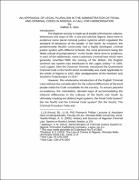An appraisal of legal pluralism in the administration of penal and criminal codes in Nigeria: a call for harmonisation
Abstract
The Nigerian society is made up of people with diverse cultures, behaviours and ways of life. In the pre-colonial Nigeria, there were in existence some plural criminal justice systems which regulated the standard of behaviour of the people. In the North, for instance, the predominantly Muslim community had a highly developed criminal justice system with different Schools, the most prominent being the Maliki school of jurisprudence.1 In the South, there were in existence, in each of the settlements, some customary criminal laws which were generally unwritten.2With the coming of the British, the English common law system was introduced in the Lagos colony.3 In 1904, Lord Lugard, then the Governor General, introduced the Queensland Criminal Code in the North which incidentally was made applicable to the whole of Nigeria in 1916, after amalgamation of the Northern and Southern Protectorates in 1914.

